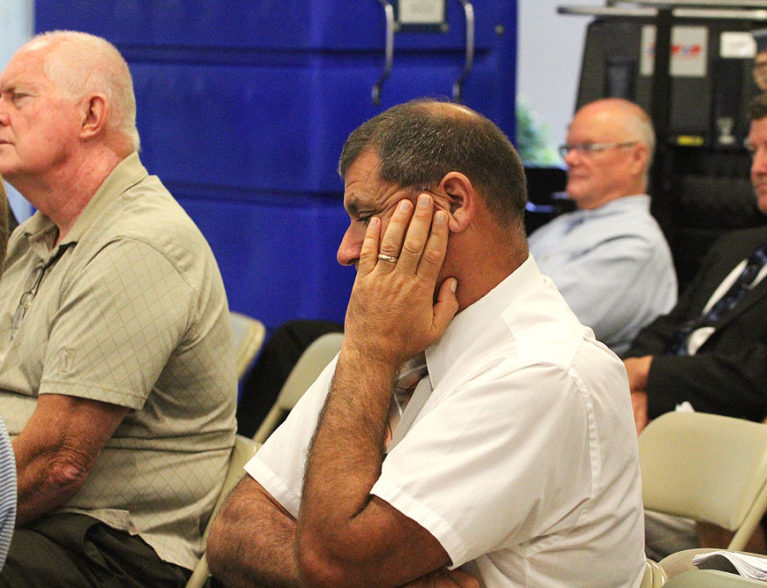
INDIAN RIVER SHORES — In the first session of what is expected to be a months’ long effort to settle a pending law suit between Vero Beach and its outside electric customers, three legal teams walked away after three hours agreeing on at least one thing — Vero’s electric rates are too high.
A crowd of 35 people, including several elected officials and utility activists gathered in the Indian River Shores Community Center for the meeting, which was part of a state-mandated process initiated whenever towns or cities sue each other.
After introductions of key players from Indian River Shores, Vero Beach and Indian River County and an overview by Shores’ lead utility counsel Bruce May of Holland and Knight, 11 electric ratepayers spoke during the public comment portion.
Bruce May presented the case for his client, saying that the Town believes Vero’s rates are unreasonable — which would constitute a violation of the Town’s franchise agreement — and that every year Vero’s general fund is “unjustly enriched” via transfers of millions of dollars in transfers paid by customers outside the city, which May characterized as “captive.”
Shores residents want low Florida Power and Light rates, either from Vero or from FPL, May said. If Vero can figure out how to sell the utility to FPL, that would be the best possible outcome. But unless that happens, Shores residents are paying 25 to 30 percent higher rates than their neighbors on the FPL system.
“We have no reason to believe that the rate differential will get better anytime soon,” May said, adding that there’s a real concern that the difference or delta between Vero and FPL rates will get worse.
If Vero can’t match FPL rates, the Shores is prepared to kick Vero out of the town after its franchise agreement expires in November 2016.
Vero’s utility attorney Robert Scheffel “Schef” Wright admitted that Vero’s rates are “higher than we wish they were,” but “I would dispute that our rates are unreasonable.”
“Our rates are what they are because our costs are what they are,” Wright said.
County Attorney Dylan Reingold and outside utility counsel Floyd Self from Tallahassee pointed out that they represent not only the Vero electric customers in the unincorporated county, but all of Vero’s 34,000 ratepayers.
The County’s legal team urged Vero to not give up on the full sale of the system to FPL. Reingold suggested it would be helpful to bring representatives from the FMPA and OUC in to explain to the parties why the rates are so high and why Vero can’t exit the co-op.
Though the option was left open, May said those entities are not party to the lawsuit and bringing them in could detract from the issue at hand and bog down the process.
No proposed resolution was offered, though Schef did concede that the city was open to moving toward setting up a utility authority to govern Vero electric.
All sides agreed to get back together at 9 a.m. on Sept. 26 to discuss Vero’s rates in detail, and to meet a couple of weeks later to talk about how a utility authority might work.
Indian River County has joined the conflict resolution process as a conflicting government entity, but the County itself has not filed suit in circuit court against Vero.
County officials at this time have opted to file a complaint with the Florida Public Service Commission requesting a declaratory judgement outlining what the County’s rights are when its own 30-year franchise agreement with Vero expires in March 2017.
Wright has filed a response on behalf of Vero asking the Florida Public Service Commission to dismiss the County’s action on the grounds that Vero’s so-called “permanent” electric service territory trumps any franchise agreement that may or may not be in effect.
The PSC has until October to tell the County whether or not it will take up its complaint.



